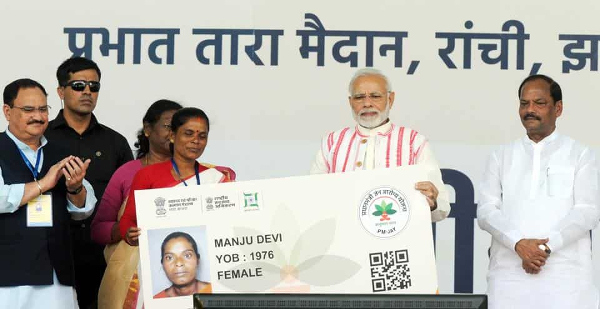When Ayushman Bharat was originally announced and formally launched on September 23, 2018, many doubted the ability of this transformational scheme to see the light of the day. Three months into the scheme, over 600,000 individuals already benefited, 33 states/UT’s signed up, Ayushman Bharat is on track to transform healthcare in India forever. The past four years have seen India innovating homegrown solutions for local problems, and in a way that is effective in cost, scale and speed, a movement that has been led from the front by Prime Minister Narendra Modi. The pace and extent of real transformation, on the ground, by the government is unprecedented.
It is with the confidence of leadership, execution capability and digitally powered infrastructure that the government launched Ayushman Bharat Scheme, the biggest healthcare scheme in the world. Nearly 40 per cent of India’s population now have access to an annual health coverage of up to Rs 5 lakh (a phenomenal increase from the earlier Rs 35,000) and beneficiaries will not have to pay any share of the insurance premium. The programme has also initiated a never-before focus on institutional transformation. Rs 1,200 crore have been allocated to set up Health and Wellness Centres as the foundation of primary healthcare and preventive care for the country’s poor and marginalised. Upgradation of district hospitals has been announced, and the benefits of Ayushman Bharat can be availed both in public and empanelled private institutions. Ayushman Bharat will also have a great impact on job creation, with a multiplier impact on the allied sectors — pharmaceuticals, medical devices, diagnostics — creating a pool of over 100,000 jobs and thus giving a major impetus to the overall economy of the nation.
Digital Health for a Digital India
The scale of this ambitious healthcare programme is possible due to the digital infrastructure the government has created over the last few years. Digital India has led to 100 per cent teledensity at the household level and close to 40 per cent of our population now has internet access. 99 per cent of adults have a digital identity and 100 per cent households have a bank account, allowing for the innovative & digital interlinking of the Jan Dhan, Aadhaar and Mobile, which will foster the delivery of this scheme in a targeted, paperless, cashless and portable manner. The government is already reaching out to the last person across the length and breadth of the nation through SMS and voice calls.
Hospitals are digitally enrolling beneficiaries based on census data and through their digital identity. Health records will be standardised, made paperless and portable — 6 million migrants who move cities annually will able to access their health data securely and seamlessly on a digital platform regardless of their geographic location. Over 13,000 hospitals have already consented to the scheme, which can create the base of a national electronic health registry of service providers, allowing citizens to recognise hospitals that provide high-quality care at lower cost. And finally, the government’s BHIM-UPI based direct payments system will allow for a cashless and hassle-free transaction process in claim management, both for insurers and hospitals.
The combination of digital registries, claims platform and health records accessible through a singular consent-based platform, the ‘AyushmanBharat’ Stack, will solve the problem of data fragmentation plaguing the healthcare industry. Artificial Intelligence, big data analytics and machine learning will not only help in preventive healthcare for 1,300 diseases currently covered by the scheme but will also be instrumental in solving the critical problem of over-prescription and fraud detection.
From Illness to Wellness
The design and sheer scale of Ayushman Bharat will lead to three fundamental changes in the industry — increased presence, lower premiums and better plans. Private healthcare providers will have to recalibrate their strategy to ensure a larger role in expanding the universal health coverage and increase their presence in non-urban areas. By developing an approach of addressing primary care needs and wisely cohabiting with public health insurance, Ayushman Bharat incentivises private health insurers to play a critical role in providing affordable health care access for all citizens, resulting in significant improvement in health outcomes for the next Billion.
The scheme is a timely intervention by the Modi government to improve the lives of 50 crores of our most vulnerable citizens who, despite spending exorbitant out-of-pocket expenditure on private healthcare, have suffered from poor health, high mortality and life at the edge of poverty. Ayushman Bharat will ensure that the millions of citizens who have come out of poverty, stay on course for an upward climb and are no longer one illness away from getting back into poverty or debt trap.
Poonam Khetrapal Singh is the Regional Director, WHO South-East Asia
Source:DNAIndia
Image Courtesy:Hindustan Times
You may also like
-
India Against Mpox
-
Combination of ‘Siddha’ Drugs Reduces Anemia in Adolescent Girls: Study
-
Suspected Mpox Case Under Investigation; Patient Put Under Isolation, No Cause for Alarm
-
Prime Minister Applauds India’s Best Ever Performance at the Paralympic Games
-
National Exit Test (NExT) for Ayush to be Effective from 2021-2022 Batch: Union Minister of Ayush Shri Prataprao Jadhav
